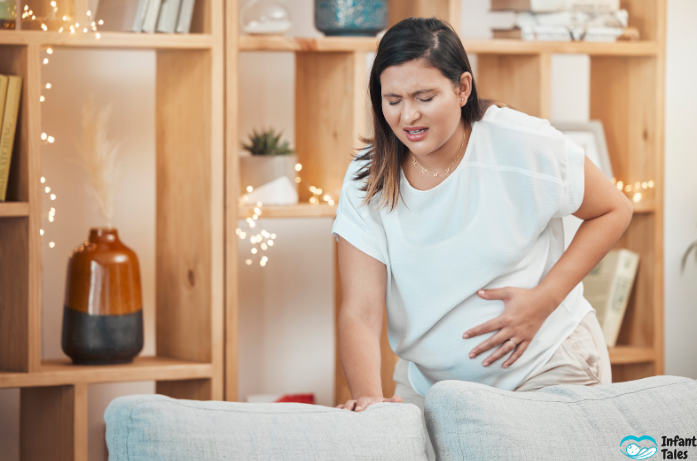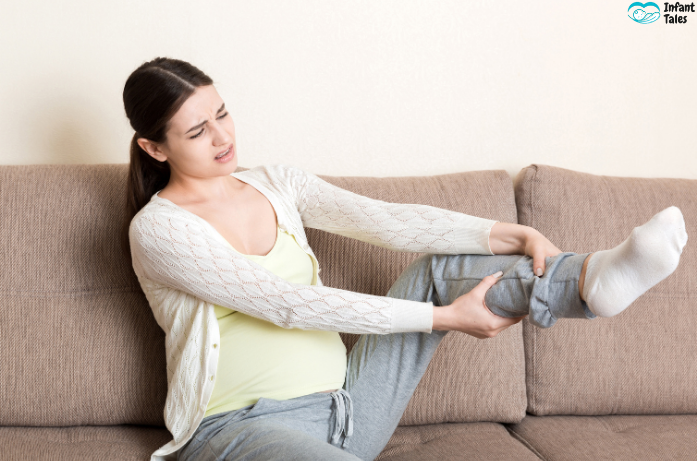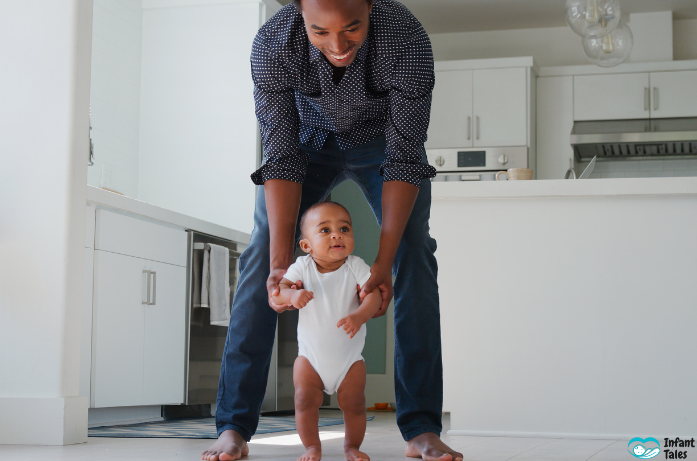By a Caring Mom at Infant Tales
Pregnancy is a beautiful and transformative journey, but it can also bring sensations that feel unfamiliar, especially during the early weeks. Many moms-to-be experience early pregnancy pains, which can include mild cramping, twinges, or pressure in the lower abdomen. Although often these feelings cause anxiety, in most cases they are just a sign of the body physiologically adapting to pregnancy.
Your uterus, ligaments, and hormones are changing rapidly to support new life, and this can create pregnancy cramps that mimic period-like pain. When you realize what these early pregnancy pains mean, you not only stay calm but also know the right time to get medical consult.
What Are Early Pregnancy Pains?
In the first trimester, many women feel mild aches known as early pregnancy pains. The period for these pains is between weeks 4 and 12 and they could be a little like menstrual cramps or even speaking in terms of gentle pulling in the lower belly or back. The secret is simply: your uterus is expanding, blood flow is increasing, and your hormones are playing tricks on you.
Most of these first trimester pains are normal and short-lived. However, sharp or severe pain, especially if it occurs on one side or with bleeding, should never be ignored. Recognizing normal discomfort versus pain that may signal complications is key to a healthy pregnancy.
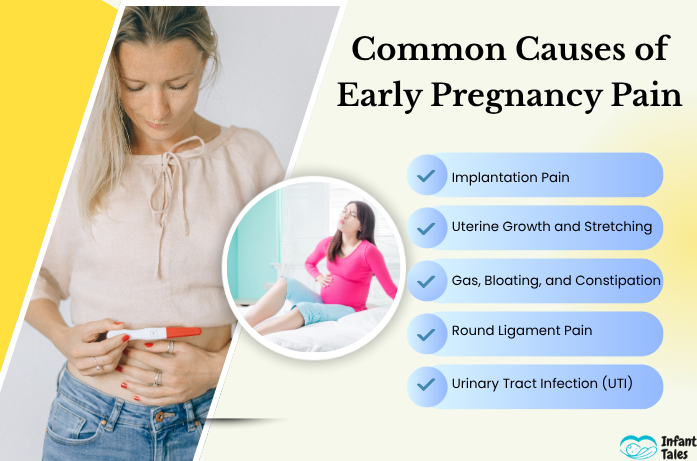
Common Causes of Early Pregnancy Pain
Let us look at the most common reasons behind the early pregnancy pains and what adjustment your body is going through during this period.
1. Implantation Pain
The fertilized egg embeds itself in the uterine wall 6-12 days post-conception. Some women feel slight cramps or see spots during this event. These sensations are among the first signs of pregnancy and are frequently interpreted as light periods.
According to the American Pregnancy Association, implantation pain is generally mild and short-lived. It is just a signal that the uterine pregnancy is starting to get its proper place.
2. Uterine Growth and Stretching
As your pregnancy progresses, your uterus begins expanding to accommodate your growing baby. This stretching can lead to mild early pregnancy cramps and a feeling of fullness or pressure in your lower abdomen.
It is because the ligaments and muscles around the uterus have to be stretched that sometimes you may feel pulling or tugging sensations. These uneasy feelings are not unusual in the first trimester and they pass. The strain can be relieved by taking rest and changing positions slowly.
3. Gas, Bloating, and Constipation
One of the less glamorous parts of pregnancy involves digestion changes. Increased progesterone relaxes muscles, including those in your digestive tract, thus slowing down the entire process of digestion and causing the early pregnancy symptoms of gas or bloating.
You can easily manage this by drinking a lot of water, consuming more fiber-rich foods like fruits, vegetables, whole grains, and being lightly active throughout the day. Consistent activity such as walking helps keep constipation away and lessens the discomfort due to bloating in the first trimester.
4. Round Ligament Pain
Round ligament pain is another common reason behind early pregnancy pains. The round ligaments are sole of the tissue that supports your uterus. As the size of the uterus expands, the ligaments stretch, thus producing sharp or burrowing feelings in the lower abdomen area.
You might notice them during unexpected movements like quickly getting up, coughing, or laughing. Although this may seem scary, it is a harmless phase and part of the normal pregnancy stretching process. Moving more slowly and doing light stretches may help to avoid the discomfort, according to the Cleveland Clinic.
5. Urinary Tract Infection (UTI)
In some cases, early pregnancy discomforts may indicate a problem such as a urinary tract infection. UTIs are more common during pregnancy because hormonal changes can slow urine flow and make it easier for bacteria to grow.
Pain from a UTI can feel like pressure or cramping in the lower belly and is often accompanied by burning urination or frequent urges to go. According to the Mayo Clinic, it is advisable to call your doctor when such symptoms show up, as untreated infections may result in complications.
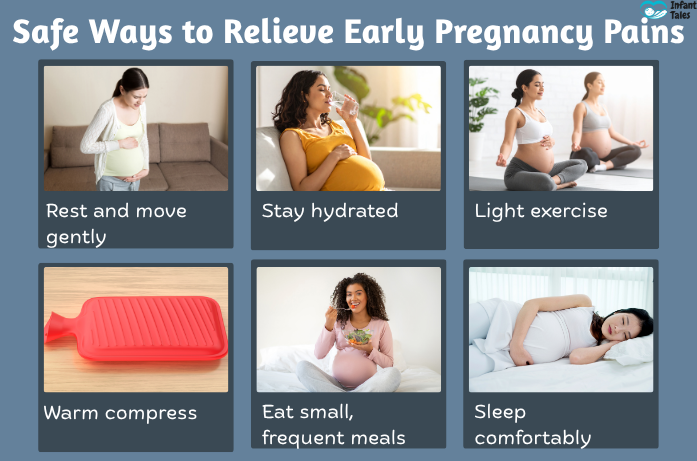
Safe Ways to Relieve Early Pregnancy Pains
The majority of early pregnancy pains can be treated at home through self-care and minor changes in lifestyle.
- Rest and move gently: Take short breaks and avoid sudden twisting or bending that will strain your abdomen.
- Stay hydrated: Drinking large amounts of fluids reduces cramping and keeps you free from pain related to dehydration.
- Light exercise: Gentle prenatal yoga, stretching, or walking will help improve circulation and reduce discomfort during pregnancy.
- Warm compress: A warm (but not hot) water bottle applied to the lower back or belly can relieve soreness.
- Eat small, frequent meals: Helps with digestion and prevents bloating-related pregnancy cramps.
- Sleep comfortably: Lying on your left side helps increase blood flow to the baby.
Do not use strong painkillers, high-temperature heating pads, or hot tubs while pregnant, as these can heighten the risks. It is always a good practice to consult your doctor prior to beginning any new medication.
When to Call Your Doctor
Mild early pregnancy pains are normal, but persistent or intense pain should never be ignored. Contact your healthcare provider immediately if you notice:
- Sharp or severe pain that does not go away with rest
- Pain with vaginal bleeding or clotting
- Fever, vomiting, or light headedness
- Shoulder pain or fainting sensations
- Painful urination, chills, or cloudy urine
The American College of Obstetricians and Gynecologists (ACOG) recommends assessing abdominal pain that hinders daily activities always. It is for sure that the reason is only ordinary pregnancy cramps but still better to get the assurance from the doctor.
Tips to Prevent Early Pregnancy Discomfort
You can reduce the frequency of pregnancy pains by maintaining healthy daily habits:
- Regularly move so that your muscles and ligaments will be flexible.
- Drink enough water throughout the day to avoid dehydration.
- A well-balanced diet that is high in fiber should be taken in order to prevent bloating and constipation.
- Loose and comfortable garments should be worn that do not put pressure on the belly.
- Get enough sleep and pay attention to your body’s signals of tiredness.
- Use deep breathing, meditation, or gentle stretching for stress management.
Consistent small efforts really matter for the priming of comfort in the first trimester.
Emotional Side: Coping with Anxiety About Pain
Very often, new mothers are very easily and quickly affected by the pain of early pregnancy and that leads to worry or fear of miscarriage. It is very important to take it that mild cramps are just a sign of your body adjusting, very often. Still, anxiety during pregnancy is pretty common and perfectly normal.
Discussing your concerns with your husband or doctor can be a great relief. Practicing mindfulness, doing some light stretching or just keeping a pregnancy journal can help you turn your focus from fear to a bond with your baby. Most importantly, trust your gut feeling if something feels wrong call your doctor.
Key Takeaways
- Pain during the early stages of pregnancy is a common occurrence and it is usually the result of normal changes in one’s body such as implantation, stretching of the uterus, or shifts in digestion.
- The five main reasons are implantation pain, stretching of the uterus, round ligament pain, gas and bloating, and urinary tract infections.
- Discomfort can be managed with gentle movement, hydration, rest, and balanced nutrition.
- Severe, one-sided, or persistent pain should always be checked by a doctor.
FAQs
1. Are early pregnancy pains normal?
Yes, the uterus expanding and hormonal changes are the reasons for mild cramps or twinges which are nature’s way of confirming that implantation has taken place.
2. How do early pregnancy pains feel?
They are often likened to light menstrual cramps or a faint pulling sensation in the lower abdomen.
3. When should I call my doctor?
In cases where the pain is sharp, localized on one side, or accompanied by bleeding, dizziness, or fever, it is advised to contact the physician without any delay.
4. What are some natural ways to relieve early pregnancy pains?
Rest, stay hydrated, stretch gently, and use a warm (not hot) compress to ease discomfort.
5. Can gas or constipation lead to pain during the early stages of pregnancy?
Certainly. The hormonal changes that come with pregnancy slow down the digestive process and can lead to gas and bloating, which, in turn, may manifest as mild cramps.
6. Does every woman feel early pregnancy pains?
Not necessarily, with each pregnancy being distinct. For some women, cramps are a sign while for others, there is no such thing as discomfort.
Let yourself be informed, be calm, and continue to visit Infant Tales for reliable advice, real mom experiences, and gentle guidance through each and every parenting stage.
Disclaimer: The content of this article is purely educational and has been prepared by the editorial team at Infant Tales. It is not a substitute for professional medical advice, diagnosis, or treatment. Always consult your doctor if you have any concerns during your pregnancy or related to your health.
